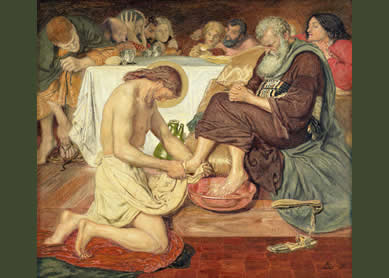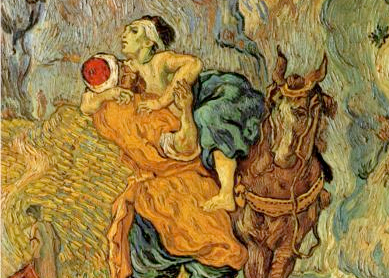The terrain surrounding Jerusalem is rugged and unforgiving: rocky hills with little water to the west, forbidding desert to the east, scorching temperatures most of the year. Travel could be dangerous, so hospitality to the traveler was an ongoing need and a sacred duty. The New Testament is full of images and stories of guests received, both those already known as friends and those strangers who are taken in and transformed into guests. Among nomadic tribes, the guest comes under the protection of the host, who guarantees inviolable safety. The important elements of hospitality include the opportunity for cleansing dusty feet, scented oil to soften dried skin and mask odors of the road, food, shelter, security, and companionship.
When Jesus sends out disciples on mission, they are to lodge in the houses where they are welcomed. Jesus’ vision of mission is impossible without this reciprocity, the reception of those who are sent by those who receive them (
The many stories of banquets in the Gospels presuppose the practice of hospitality for important events and transition moments: for example, the great dinner (
Jesus is himself the important guest in the Gospels. There is a wrong way to receive him, typified by Simon the Pharisee, who treats him poorly by offering neither water for foot washing nor oil for anointing nor gesture of welcome, while the “sinner” woman who enters uninvited receives him correctly (
Later, Paul and other itinerant missionaries rely on the hospitality of those who receive them as they journey from city to city. The Lord’s Supper was celebrated primarily, though not exclusively, in private homes that would become centers of hospitality and evangelization. At Philippi, Lydia, a merchant of purple cloth, is mesmerized by Paul’s preaching and insists that he accept her hospitality in her home that will become a center of faith (
The hearers of the Letter to the Hebrews are warned of the importance of practicing hospitality: some have in this way received angels without knowing (
At the very end of the Bible, hospitality is still an issue: Laodicea, one of the seven cities featured in Revelation, is asked to receive the risen Jesus as a guest who will come for dinner (
Bibliography
- Osiek, Carolyn, ed. Anselm Academic Bible. Winona, MN: Anselm Academic, 2013.
- Arterbury, Andrew. Entertaining Angels: Early Christian Hospitality in its Mediterranean Setting. New Testament Monographs 8. Sheffield, UK: Sheffield, 2005.
- Osiek, Carolyn, with David L. Balch. Families in the New Testament World: Households and House Churches. Louisville: Westminster John Knox, 1997.
- Osiek, C. and M. Y. MacDonald, with J. Tulloch. A Woman’s Place: House Churches in Earliest Christianity. Minneapolis, Minn.: Fortress, 2006.



